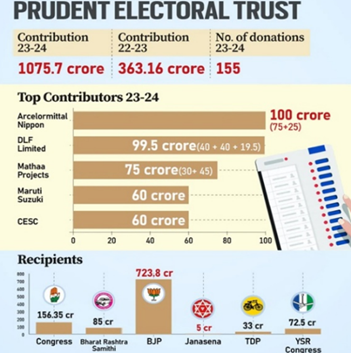Why in news?
As per the electoral trust contribution reports released by the Election Commission of India (ECI), donations to political parties saw a significant increase through electoral trusts after the Supreme Court’s decision to scrap electoral bonds in February 2024.
What’s in today’s article?
- What are Electoral trusts?
- Benefits of Electoral Trusts Over Electoral Bonds
- Surge in Donations to Political Parties Through Electoral Trusts
What are Electoral trusts?
- About
- Electoral trusts are non-profit organizations created to facilitate transparent political funding in India.
- They act as intermediaries, collecting voluntary contributions from individuals or companies and distributing them to registered political parties.
- Companies which can establish electoral trusts
- Any company registered under section 25 of the Companies Act, 1956, can seek approval to form an electoral trust.
- Creation
- The concept was introduced under the Income Tax Act, 1961, through Section 13B, which provides tax benefits to donors.
- The Election Commission of India (ECI) regulates electoral trusts, and their functioning is governed by the Electoral Trusts Scheme, 2013 introduced by the Ministry of Finance.
- Who Can Donate
- Indian citizens.
- Domestic companies registered under the Companies Act, 2013.
- Donors are required to disclose their identity and the amount contributed.
- Who Cannot Donate
- Foreign companies or individuals.
- Government companies.
- Entities prohibited under the Representation of the People Act, 1951, such as trusts that receive foreign funds.
- Issues
- Transparency Concerns: While trusts disclose the donors' names, the specific amounts donated to each political party are not publicly available.
- Corporate Influence: Large corporate donors dominate the trust system, raising concerns about undue political influence.
- Inequitable Distribution: A significant portion of the funds goes to ruling or major political parties, sidelining smaller ones.
- Lack of Donor Diversity: Contributions are primarily from a limited number of large corporations, leading to concentration of influence.
Benefits of Electoral Trusts Over Electoral Bonds
- Transparency in Donations
- Electoral trusts are legally required to disclose the names of donors and the amounts received to the ECI.
- Electoral bonds, on the other hand, allow anonymous donations, making it difficult to trace the source of funds.
- Accountability of Political Parties
- Electoral trusts mandate disclosure of the contributions disbursed to political parties. This ensures that the public knows which party received how much funding.
- Electoral bonds do not require such disclosures, limiting accountability.
- Regulatory Oversight
- Electoral trusts are governed by the Electoral Trusts Scheme, 2013, and their operations are closely monitored by the ECI, ensuring adherence to legal guidelines.
- Electoral bonds are managed by banks, with little transparency about regulatory scrutiny.
- Prevention of Foreign Influence
- Electoral trusts prohibit foreign donations, reducing the risk of foreign interference in Indian politics.
- Electoral bonds do not explicitly restrict foreign-controlled entities registered in India from purchasing bonds, raising concerns about foreign influence.
Surge in Donations to Political Parties Through Electoral Trusts
- About the news
- The Supreme Court's February 15, 2024, ruling to scrap the electoral bonds scheme led to a significant shift in corporate political donations, redirecting them to the electoral trust route.
- Electoral Trust, the largest contributor, witnessed a sharp surge in donations during the subsequent months, highlighting a diversion of funds from bonds to trusts.

- Transparency in Electoral Trusts vs Electoral Bonds
- Unlike the anonymity of electoral bonds, trusts are required to disclose donor names and amounts distributed to political parties.
- However, the exact allocation of individual corporate contributions to specific parties is not revealed.










